SCIENCE C453 (C453)
Western Governors University
All 11 results
Sort by
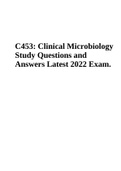
-
C453: Clinical Microbiology Study Questions and Answers Latest 2022 Exam & C453 Clinical Microbiology Study Questions With Answers (Updated 2022) A+
- Package deal • 2 items • 2023
-
- $21.49
- + learn more
C453: Clinical Microbiology Study Questions and Answers Latest 2022 Exam & C453 Clinical Microbiology Study Questions With Answers (Updated 2022) A+

-
C453: Clinical Microbiology Study Questions and Answers Latest 2022 Exam.
- Exam (elaborations) • 21 pages • 2022
- Available in package deal
-
- $10.49
- + learn more
C453: Clinical Microbiology Study Questions and Answers Latest 2022 Exam. Describe the basic characteristics of bacteria Prokaryotic, single-celled organisms surrounded by a cell membrane Genetic material found in nuclear region (nucleoid) Cell division by binary fission; asexual reproduction 2) Describe the components of the following cell walls, including the size of the peptidoglycan layer and fully describe any unique components of the cell wall: a. Gram positive- 20-80nm t...
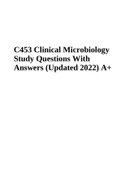
-
C453 Clinical Microbiology Study Questions With Answers (Updated 2022) A+
- Exam (elaborations) • 82 pages • 2022
- Available in package deal
-
- $10.49
- + learn more
C453 Clinical Microbiology Study Questions With Answers (Updated 2022) A+. Describe the general characteristics of bacteria by answering the following questions. a. Are bacteria prokaryotic or eukaryotic? Why? Prokaryotic because their genetic material (DNA) is not housed within a true nucleus. b. Single-celled or multicellular? Why? Usually unicellular c. Can they be seen with the naked eye? Why? No; typically they are about 1um (need to be at least 100um to be visible without a microscope...
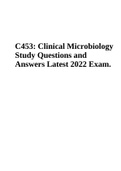
-
C453: Clinical Microbiology Study Questions and Answers Latest 2022 Exam.
- Exam (elaborations) • 21 pages • 2022
-
Available in package deal
-
- $9.49
- + learn more
C453: Clinical Microbiology Study Questions and Answers Latest 2022 Exam. Describe the basic characteristics of bacteria Prokaryotic, single-celled organisms surrounded by a cell membrane Genetic material found in nuclear region (nucleoid) Cell division by binary fission; asexual reproduction 2) Describe the components of the following cell walls, including the size of the peptidoglycan layer and fully describe any unique components of the cell wall: a. Gram positive- 20-80nm t...
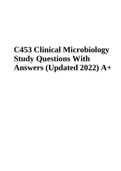
-
C453 Clinical Microbiology Study Questions With Answers (Updated 2022) A+
- Exam (elaborations) • 82 pages • 2022
-
Available in package deal
-
- $8.49
- 1x sold
- + learn more
C453 Clinical Microbiology Study Questions With Answers (Updated 2022) A+. Describe the general characteristics of bacteria by answering the following questions. a. Are bacteria prokaryotic or eukaryotic? Why? Prokaryotic because their genetic material (DNA) is not housed within a true nucleus. b. Single-celled or multicellular? Why? Usually unicellular c. Can they be seen with the naked eye? Why? No; typically they are about 1um (need to be at least 100um to be visible without a microscope...
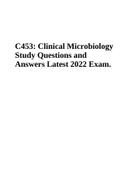
-
C453: Clinical Microbiology Study Questions and Answers Latest 2022 Exam
- Exam (elaborations) • 21 pages • 2022
-
- $10.49
- + learn more
C453: Clinical Microbiology Study Questions and Answers Latest 2022 Exam. Describe the basic characteristics of bacteria Prokaryotic, single-celled organisms surrounded by a cell membrane Genetic material found in nuclear region (nucleoid) Cell division by binary fission; asexual reproduction 2) Describe the components of the following cell walls, including the size of the peptidoglycan layer and fully describe any unique components of the cell wall: a. Gram positive- 20-80nm t...
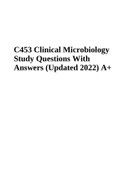
-
C453 Clinical Microbiology Study Questions With Answers (Updated 2022) A+
- Exam (elaborations) • 82 pages • 2022
-
- $8.49
- + learn more
C453 Clinical Microbiology Study Questions With Answers (Updated 2022) A+. Describe the general characteristics of bacteria by answering the following questions. a. Are bacteria prokaryotic or eukaryotic? Why? Prokaryotic because their genetic material (DNA) is not housed within a true nucleus. b. Single-celled or multicellular? Why? Usually unicellular c. Can they be seen with the naked eye? Why? No; typically they are about 1um (need to be at least 100um to be visible without a microscop...
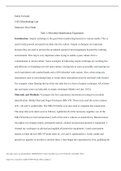
-
Emily Eversole C453 Microbiology Lab Instructor: Kim ShahiTask 2: Microbial Identification Experiment
- Essay • 9 pages • 2022
-
- $7.99
- + learn more
Task 2: Microbial Identification Experiment Introduction: Aseptic technique is the goal when transferring bacteria to various media. This is used to help prevent unwanted microbes into the culture. Aseptic techniques are important because they are used to prevent the accidental spread of microorganisms beyond the working environment. This step is very important when trying to isolate a pure culture from a contaminated or mixed culture. Some examples of following aseptic technique are workin...

-
Professional Roles and Values C304 Task 1 Kimberly Hopkins
- Exam (elaborations) • 19 pages • 2022
-
- $8.99
- + learn more
The nursing theory, Adaptation Model by Sister Callista Roy, has profoundly influenced my values and goals as a labor and delivery nurse. This model focuses on the client’s adaptation to condition using environmental stimuli to adjust the client’s perception of a healing environment (Vitalsource, 2017). A1. Excellent Nursing Practices Nurses apply the Adaptation Model to implement excellent nursing care by assuming the role of agent of change when the patient or client has a condition...

-
Task 2 Culturing Microbes Lab Report Carmen Evenson Clinical Microbiology – C453
- Exam (elaborations) • 8 pages • 2022
-
- $8.49
- + learn more
UES Aseptic techniques are a very important safety procedure when working with any agents or experiments. They are designed to help keep a sterile environment to perform the tests. This is necessary for a few reasons. First, it is necessary to keep any infectious agents from spreading to other surfaces where they might be picked up by people or animals. It is also very important to maintain accuracy of the test. If the field is not sterile and cleaned with aseptic techniques, you risk intr...

How did he do that? By selling his study resources on Stuvia. Try it yourself! Discover all about earning on Stuvia


